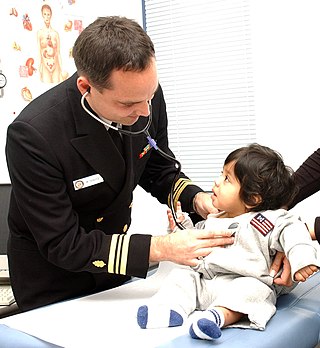Related Research Articles

An oncology nurse is a specialized nurse who cares for cancer patients. These nurses require advanced certifications and clinical experiences in oncology further than the typical baccalaureate nursing program provides. Oncology nursing care can be defined as meeting the various needs of oncology patients during the time of their disease including appropriate screenings and other preventive practices, symptom management, care to retain as much normal functioning as possible, and supportive measures upon end of life.

Pediatric nursing is part of the nursing profession, specifically revolving around the care of neonates and children up to adolescence. The word, pediatrics, comes from the Greek words 'paedia' (child) and 'iatrike' (physician). 'Paediatrics' is the British/Australian spelling, while 'pediatrics' is the American spelling.

A nurse practitioner (NP) is an advanced practice registered nurse and a type of mid-level practitioner. NPs are trained to assess patient needs, order and interpret diagnostic and laboratory tests, diagnose disease, prescribe medications and formulate treatment plans. NP training covers basic disease prevention, coordination of care, and health promotion.
Home health is a nursing specialty in which nurses provide multidimensional home care to patients of all ages. Home health care is a cost efficient way to deliver quality care in the convenience of the client's home. Home health nurses create care plans to achieve goals based on the client's diagnosis. These plans can include preventive, therapeutic, and rehabilitative actions. Home health nurses also supervise certified nursing assistants. The professional nursing organization for home health nurses is the Home Healthcare Nurses Association (HHNA). Home health care is intended for clients that are well enough to be discharged home, but still require skilled nursing personnel to assess, initiate and oversee nursing interventions.

Dental assistants are members of the dental team. They support a dental operator in providing more efficient dental treatment. Dental assistants are distinguished from other groups of dental auxiliaries by differing training, roles and patient scopes.
A clinical nurse specialist (CNS) is an advanced practice nurse who can provide advice related to specific conditions or treatment pathways. According to the International Council of Nurses (ICN), an Advanced Practice Nurse is a registered nurse who has acquired the expert knowledge base, complex decision-making skills and clinical competencies for expanded practice, the characteristics of which are shaped by the context and/or country in which s/he is credentialed to practice.
Faith Community Nursing, also known as Parish Nursing, Parrish Nursing, Congregational Nursing or Church Nursing, is a movement of over 15,000 registered nurses, primarily in the United States. There are also Parish nurses in Australia, the Bahamas, Canada, England, Ghana, India, Kenya, Korea, Madagascar, Malawi, Malaysia, New Zealand, Nigeria, Palestine, Pakistan, Scotland, Singapore, South Africa, Swaziland, Ukraine, Wales, Zambia and Zimbabwe. Faith community nursing is a practice specialty that focuses on the intentional care of the spirit, promotion of an integrative model of health and prevention and minimization of illness within the context of a community of faith. The intentional integration of the practice of faith with the practice of nursing so that people can achieve wholeness in, with, and through the population which faith community nurses serve.
Case management is a managed care technique within the health care coverage system of the United States. It involves an integrated system that manages the delivery of comprehensive healthcare services for enrolled patients. Case managers are employed in almost every aspect of health care and these employ different approaches in the control of clinical actions.

Nursing in the United States is a professional health care occupation. It is the largest such occupation, employing millions of certified professionals. As of 2023, 3,175,390 registered nurses were employed, paid a median income of $86,070.
Health advocacy or health activism encompasses direct service to the individual or family as well as activities that promote health and access to health care in communities and the larger public. Advocates support and promote the rights of the patient in the health care arena, help build capacity to improve community health and enhance health policy initiatives focused on available, safe and quality care. Health advocates are best suited to address the challenge of patient-centered care in our complex healthcare system. The Institute of Medicine (IOM) defines patient-centered care as: Health care that establishes a partnership among practitioners, patients, and their families to ensure that decisions respect patients' wants, needs, and preferences and that patients have the education and support they need to make decisions and participate in their own care. Patient-centered care is also one of the overreaching goals of health advocacy, in addition to safer medical systems, and greater patient involvement in healthcare delivery and design.

Gerontological nursing is the specialty of nursing pertaining to older adults. Gerontological nurses work in collaboration with older adults, their families, and communities to support healthy aging, maximum functioning, and quality of life. The term gerontological nursing, which replaced the term geriatric nursing in the 1970s, is seen as being more consistent with the specialty's broader focus on health and wellness, in addition to illness.

Dental Public Health (DPH) is a para-clinical specialty of dentistry that deals with the prevention of oral disease and promotion of oral health. Dental public health is involved in the assessment of key dental health needs and coming up with effective solutions to improve the dental health of populations rather than individuals.

A family nurse practitioner (FNP) provides continuing and comprehensive healthcare for the individual and family across all ages, genders, diseases, and body systems. Primary care emphasizes the holistic nature of health and it is based on knowledge of the patient in the context of the family and the community, emphasizing disease prevention and health promotion.

Nursing is a health care profession that "integrates the art and science of caring and focuses on the protection, promotion, and optimization of health and human functioning; prevention of illness and injury; facilitation of healing; and alleviation of suffering through compassionate presence". Nurses practice in many specialties with varying levels of certification and responsibility. Nurses comprise the largest component of most healthcare environments. There are shortages of qualified nurses in many countries.
Ambulatory care nursing is the nursing care of patients who receive treatment on an outpatient basis, ie they do not require admission to a hospital for an overnight stay. Ambulatory care includes those clinical, organizational and professional activities engaged in by registered nurses with and for individuals, groups, and populations who seek assistance with improving health and/or seek care for health-related problems. The American Academy of Ambulatory Care Nursing (AAACN) describes ambulatory care nursing as a comprehensive practice which is built on a broad knowledge base of nursing and health sciences, and applies clinical expertise rooted in the nursing process.

Holistic nursing is a way of treating and taking care of the patient as a whole body, which involves physical, social, environmental, psychological, cultural and religious factors. There are many theories that support the importance of nurses approaching the patient holistically and education on this is there to support the goal of holistic nursing. The important skill to be used in holistic nursing would be communicating skills with patients and other practitioners. This emphasizes that patients being treated would be treated not only in their body but also their mind and spirit.. Holistic nursing is a nursing speciality concerning the integration of one's mind, body, and spirit with his or her environment. This speciality has a theoretical basis in a few grand nursing theories, most notably the science of unitary human beings, as published by Martha E. Rogers in An Introduction to the Theoretical Basis of Nursing, and the mid-range theory Empowered Holistic Nursing Education, as published by Dr. Katie Love. Holistic nursing has gained recognition by the American Nurses Association (ANA) as a nursing specialty with a defined scope of practice and standards. Holistic nursing focuses on the mind, body, and spirit working together as a whole and how spiritual awareness in nursing can help heal illness. Holistic medicine focuses on maintaining optimum well-being and preventing rather than just treating disease.
Occupational health nursing is a specialty nursing practice that provides for and delivers health and safety programs and services to workers, worker populations, and community groups. The practice focuses on promotion, maintenance and restoration of health, prevention of illness and injury, and protection from work‐related and environmental hazards. Occupational health nurses (OHNs) aim to combine knowledge of health and business to balance safe and healthful work environments and a "healthy" bottom line.
Chronic disease in Northern Ontario is a population health problem. The population in Northern Ontario experiences worse outcomes on a number of important health indicators, including higher rates of chronic disease compared to the population in the rest of Ontario.
A mental health nurse (MHN) refers to a nurse in the UK, who specializes in the care of patients with mental health issues. The practice of MHNs is called mental health nursing.
An acute care nurse practitioner (ACNP) is a registered nurse who has completed an accredited graduate-level educational program that prepares them as a nurse practitioner. This program includes supervised clinical practice to acquire advanced knowledge, skills, and abilities. This education and training qualifies them to independently: (1) perform comprehensive health assessments; (2) order and interpret the full spectrum of diagnostic tests and procedures; (3) use a differential diagnosis to reach a medical diagnosis; and (4) order, provide, and evaluate the outcomes of interventions. The purpose of the ACNP is to provide advanced nursing care across the continuum of health care services to meet the specialized physiologic and psychological needs of patients with acute, critical, and/or complex chronic health conditions. This care is continuous and comprehensive and may be provided in any setting where the patient may be found. The ACNP is a licensed independent practitioner and may autonomously provide care. Whenever appropriate, the ACNP considers formal consultation and/or collaboration involving patients, caregivers, nurses, physicians, and other members of the interprofessional team.
References
- ↑ "Public Health Nursing Section". APHA. May 2012. Retrieved November 30, 2012.
- 1 2 American Nurses Association. (n.d.). Our Certifications. Retrieved October 28, 2020 from https://www.nursingworld.org/our-certifications/
- ↑ "Clinical Preventative Services". U.S. Department of Health and Human Services.
- ↑ "National center for health statistics: Leading health indicators". Centers for Disease Control and Prevention. April 2, 2019. Retrieved October 28, 2020.
- 1 2 "Public Health Nursing Manual". Center for Local Public Health Services. Missouri Department of Health & Senior Services. 2020.
- ↑ "Public Health Nurse". ExploreHealthCareers.org. Retrieved October 28, 2020.
- ↑ "Certification for Public Health Nursing". www.aacnnursing.org. Retrieved October 28, 2020.
- ↑ "NBPHE" . Retrieved October 28, 2020.
- 1 2 Edmonds JK, Kneipp SM, Campbell L (May 2020). "A call to action for public health nurses during the COVID-19 pandemic". Public Health Nursing. 37 (3): 323–324. doi:10.1111/phn.12733. PMC 7262140 . PMID 32281160.
- ↑ Vandenhouten CL, DeVance-Wilson CL, Little BB (2015). "Credentialing Public Health Nurses: Current Issues and Next Steps Forward". Public Health Nursing. 32 (5). Boston, Mass.: 565–76. doi:10.1111/phn.12206. PMID 26076925.
- ↑ Ezhova I, Sayer L, Newland R, Davis N, McLetchie-Holder S, Burrows P, Middleton L, Malone ME (July 2020). "Models and frameworks that enable nurses to develop their public health practice-A scoping study". Journal of Clinical Nursing. 29 (13–14): 2150–2160. doi:10.1111/jocn.15267. PMID 32246732. S2CID 214785515.
- ↑ Susanto T, Bachtiar S, Turwantoko T (April 2019). "Performance of Public Health Nurses and Coverage of the Nursing Care Program by Community Health Centers in Jember, Indonesia". International Journal of Community Based Nursing and Midwifery. 7 (2): 161–168. PMC 6456767 . PMID 31041326.
- 1 2 3 4 5 "Role of public health nurses". Missouri Department of Health & Senior Services.
- 1 2 3 4 5 "Role of public health nurses in communicable disease control". Arkansas State University. 2017.